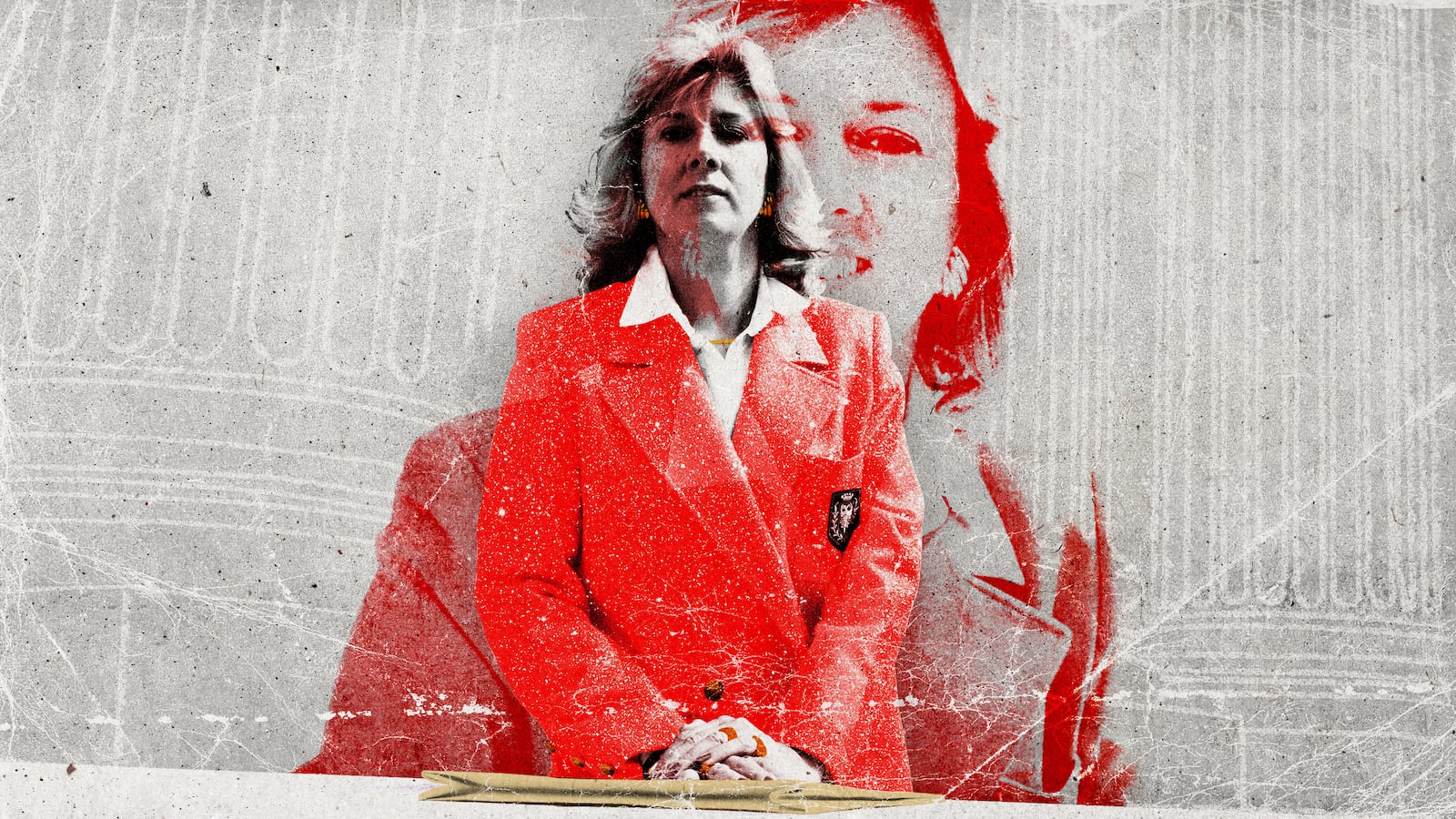For years, Linda Fairstein was a celebrated prosecutor who parlayed her sex crimes work into magazine covers, national TV profiles, and a career as a crime novelist. But the Netflix miniseries When They See Us, and its focus on her role in the Central Park Five case, has made her persona non grata. In a matter of weeks, she was dropped by her publisher, prodded into stepping down from three charities, and turned into a hashtag.
And no one watched her fall more closely than Michele Reisch.
On Memorial Day weekend of 1977, Reisch says, a man entered her West Village apartment through a fifth-floor window and raped her with a gun to her head. He penetrated her vaginally, anally, and orally, she later told police, and laughed when she asked him to use lubricant. She says he bit her breasts and called her a bitch and threatened to kill her multiple times. To this day, she says, she can still remember the air being pressed out of her lungs as he pushed her into the couch, the smell of fear as he pressed the gun to her temple.
In a panic, thinking she was going to die, Reisch says she tried to appease her rapist. She complimented his sexual prowess and asked him to kiss her instead of biting her. When he left, she says, he told her she was “cool” and promised to come back. In a burst of inspiration, she replied: “Take my number. I don’t like surprises.”
It was that gesture that helped police capture her alleged attacker. Nathan Giles, then 31, had been released from prison three months earlier, after serving 15 years for stabbing an elderly woman to death with a screwdriver. He called Reisch the day after the alleged rape, using the number she had given him. Police told her to set up a meeting with him in Central Park the next day—a sting operation that worked. Giles was arrested and charged with rape, sodomy, burglary, and robbery.
The following day was the first time Reisch met Fairstein. She says the assistant district attorney—a young prosecutor making a name for herself at the country’s first sex crimes unit—told her she had a strong case and that Giles could easily get 40 years in prison.
“In those initial moments of meeting her, she is everything you want her to be,” Reisch said, recalling the box of Kleenex Fairstein kept on her desk for when victims became emotional.
Forty years became Reisch’s mantra in the weeks that followed, as Fairstein put her through the grueling paces of preparing for trial. No sentence would ever make up for what Giles had done to her, but at least it would keep him from hurting other women.
But on the day the trial was scheduled to begin, Reisch says, the DA’s office told her not to come in after all—Fairstein was going to negotiate a plea deal. Reisch says they insisted it would be easier not to face a jury and assured her that Giles would still serve time in prison. (Fairstein insists she would have told Reisch this herself, and would never have promised prison time.)
The case would have been difficult to prosecute. Judges and juries were less than sympathetic to rape victims at the time, without a modern understanding of how trauma can affect victims’ memories and behavior. The judge in the case, Burton Roberts, had ruled that Giles’ criminal history could not be admitted in court. And the defense had found five witnesses who swore they saw Giles and a woman who looked like Reisch leaving the party together that night.
But when Fairstein entered the courtroom, she didn’t just leave it at that. She told the judge she wanted a plea deal because of the “very substantive problems that were involved with the victim's story.” She claimed Reisch did not have the “appropriate” response to her assault, and said police thought she had an “unusual[ly] calm demeanor for a victim of such an allegedly unpleasant incident.”
Fairstein also claimed Resich said she did not object to the sexual contact, only to the presence of the gun, and found the assailant to be “a very attractive young man.” Finally, Fairstein said she was concerned that Reisch wanted to write a book or movie about the case. “I was troubled, in interviewing her, with many aspects of her story,” she told the judge.
Roberts responded by praising Fairstein for her good judgment and fair-mindedness. He agreed to let Giles plea to a single charge of criminal possession of a dangerous weapon.
“The people of this county are indeed fortunate to have a person of your balance and your good judgment in charge of the prosecution of sex crimes, where emotion sometimes runs rampant and an injustice can be done to invidivudals charged with that crime,” Robers told Fairstein.
He added: “It is indeed important to have someone of your balance and good judgment to separate the wheat from the chaff, so to speak, or the truth from fantasy, if you will, and to see that justice is done.”
As Roberts and the rest of New York soon learned, that sense of justice would be short-lived.

Michele Reisch says Linda Fairstein promised an accused rapist would be locked up. Instead he was set free to murder.
Courtesy Michele ReischToday, Resich is a graying 69-year-old, with a dark sense of humor and a penchant for floral prints. She always intended to be a costume designer, she says, but had to put her career on hold following the trauma of her assault. Later, she stalled her career again by moving to Washington, D.C., to care for her ailing mother. She eventually settled for working in the wardrobe department for Broadway shows, doing laundry and stitching hems just feet from the designers doing her dream job.
Reisch says she tries to keep the events of 1977 out of her mind, but it still creeps up on her in unexpected ways. Once, when she went to see Back to the Future in theaters, she curled up in a ball when one of the characters was assaulted. She didn’t even realize what she was doing until her date asked her what was wrong.
Each Memorial Day weekend, Reisch says, she still gets a feeling of dread—a sense that if she can just make it through those three days, she can live to see another year. One year she almost forgot about the anniversary, she said, until she woke up Monday morning in a cold sweat.
Lately, Reisch has also given up on dating. She had a few boyfriends throughout the years, and even tried dating women—“like maybe that was the answer,” she said. But getting close to someone always involves deciding whether or not to share her story, and sharing it requires tears and explanations and reassurances and reopening old wounds. “I kind of somewhere along the line concluded that I make a really good friend,” she said.
Now she lives in an apartment in midtown Manhattan with her cat, and a doorman who gives her some sense of security. She says she doesn’t think about Fairstein often, except to wonder why she’s never offered her a public apology—especially because of what happened after the plea deal.

Linda Fairstein headed the Manhattan District Attorney’s sex-crimes bureau, the first in the nation.
Martha Cooper/New York Post ArchivesOn Oct. 5, 1978, less than six months after Fairstein cut the deal, 24-year-old Cindy Pintos was found shot to death at nine months pregnant. A month later, a 30-year-old woman named Willa Solomon was found bound, raped, and shot in her apartment. And three weeks after that, a 25-year-old nurse named Bonnie Bush was dragged off the street, shot in the head, and lit on fire.
After a dramatic shoot-out in Lower Manhattan, police arrested Bush’s killer: Nathan Giles. The gun they seized from him would also tie him to the murders of Pintos and Solomon. Giles had not been locked away after copping a plea in Reisch’s case; he was sentenced to time served and set free on parole.
“The only protection we have are the police and the DA—the people in positions of authority,” Reisch recalls thinking. “If [Fairstein] doesn’t do her job, Bonnie Bush and Willa and Cindy—all three of them—those deaths are on her.”
Reisch’s case, and the murders that followed, were well-known among the rape victims advocate community. Flora Colao, the director of rape crisis center at St. Vincent’s Hospital at the time, said she remembered several sexual assault counselors confronting Fairstein at a meeting. The prosecutor, Colao said, told the counselors Resich was an unreliable witness and suggested again that she wanted to write about a rape.
The matter would eventually fade into the background of Fairstein’s rising star. The pioneering prosecutor ran the sex crimes department for 25 years, to great acclaim, with newspapers dubbing her “Manhattan’s most famous DA." Even upon retirement, Fairstein continued to make appearances as a celebrity sex crimes expert and served as the inspiration for Law & Order: Special Victims Unit. She also became a popular fiction writer.
Throughout the years, Reisch’s case would occasionally come up in interviews or profiles—usually as the exception to the rule of Fairstein’s excellence. She would respond by calling Bush’s murder a “tragedy,” but continued to cast doubt on Reisch as a victim.
In a 20/20 segment from 1987, titled “The Woman Rapists Fear,” Fairstein again claimed Reisch had said she enjoyed having sex with her attacker and found him attractive. She also said Reisch had told her she was a “nymphomaniac,” adding that it was “the only time in my 13 years in this office that that's ever happened.” (Reisch flatly denies saying this.)
“It was one of those instances where nobody could figure out what happened,” Fairstein said in an interview with American Lawyer, eight years after Bush’s murder. “My heart goes out to Bonnie Bush and her family, but to this day I don’t know what happened with Michele Reisch.”

By the 1990s, Linda Fairstein was a celebrated prosecutor.
Michael Brennan/GettyToday, stripped of her accolades and effectively “cancelled” by the internet, Fairstein retains the same prosecutorial intensity that made her a star. In an interview with The Daily Beast, she endeavored to place Giles' case in the context of the time, when rape prosecutions were far rarer and less successful. As an assistant DA, she was responsible not just to victims, but for using the state’s time and resources effectively. She insists that at the time, and possibly even now, Reisch’s case never would have made it to trial.
Fairstein also casts herself as Reisch’s champion—the one who was ready to take the case to trial almost until the end. She said she always believed her witness, but that after Roberts refused to admit Giles’ criminal history, she would have been leaned on by superiors to drop the prosecution. Roberts, she says, probably told her there was no chance of a guilty verdict. She said she takes full responsibility for accepting the plea, but added, “It’s not likely I did it in a vacuum.”
That version of events is different than the one she presented to American Lawyer in 1986. In that interview, she repeated her concerns about the police officers who said Reisch’s behavior was "strange" and that she showed "no emotion.” She also claimed that she had gone to Roberts herself, weeks before the grand jury hearing, and told him she had some “real problems with the case.” Only then, she said, did the judge urge her to take a plea deal.
Confronted with that contradiction today, Fairstein dismissed it as semantics. She said she would never have gone to Roberts for a private meeting and was probably referring to the plea hearing. Asked why she continued to assail Reisch in media interviews over the years, she said she was just trying to defend herself. “She came out with gloves on, and I answered,” she said.
Fairstein also offered up a public apology to her witness, though she claims she apologized privately multiple times.
“My heart broke—still breaks—for Bonnie Bush’s parents; for their loss at the hands of a man I am responsible for taking a plea on,” she said. “But certainly I apologize for any pain caused to Michele Reisch.”
Reisch recalls no apology, public or private. “My first reaction is I don’t believe it. I don’t trust it. I don’t buy it,” she said when told of Fairstein’s comments this week, “Why suddenly 40 years later out of the blue is she apologizing?”
“I wish it would offer some comfort or feel better or any of that,” she added. “It really doesn’t.”

Linda Fairstein and Elizabeth Lederer have been pilloried for their roles in the Central Park 5 rape case.
Michael Norcia/New York Post ArchivesFairstein has not apologized for her role in the Central Park Five case, in which her office used coerced confessions of black and Latino teenage boys to secure five convictions that were later vacated. The accused all served at least five years in prison before another man confessed to the crime. Their convictions were overturned in 2002, with the help of DNA evidence, and they awarded $41 million in a lawsuit against the city. The case is now widely seen as an example of racial profiling and a miscarriage of justice.
But in the weeks following the debut of When They See Us, Ava DuVernay’s searing examination of the case, Fairstein insisted the teens had, at the very least, committed other crimes in the park. Writing for the Wall Street Journal earlier this month, she claimed the dramatization was “so full of distortions and falsehoods as to be an outright fabrication.”
In her interview with The Daily Beast, Fairstein suggested that her work on the Giles case—in which she sided with a black defendant who had been jailed as a teenager—disproved the allegations of racism leveled against her by the Central Park Five.
“If it was a mistake in my judgement, in [the Giles case] it was on behalf of a 15-year-old who people swore to me had straightened out,” she said. “As I did many times in my long career, I erred on the side of giving the kid a second chance.”
That’s not how many anti-rape advocates saw it. Colao and Janet O’Hare, a former counselor with New York Women against Rape, said Fairstein was more interested in scoring court victories for herself than helping victims. Both said she was notorious for taking plea deals on difficult cases that were not guaranteed wins.
Fairstein laughed at the idea that she ever shied from taking a case to trial, saying “there was no place for being cowardly” in her unit. She pointed out that she had prosecuted one of the first date-rape cases in the city. Even Colao admitted Fairstein had taken on the assault of a sex worker when few else would.
“I tried some of the toughest cases that had never been tried before,” Fairstein said. “Could we try every one of them? No… But I would stand eye to eye with anyone who said that I didn’t try them because I was afraid to try and lose them.”

Michele Reisch says she can’t believe Linda Fairstein’s apology.
Courtesy Michele ReischNone of that changes anything for Reisch, living alone in her doorman building, sweating through every Memorial Day weekend. Over the years, she has built up a sort of righteous anger over how her case was handled and the way Fairstein discussed it with the media. She still keeps press clippings from every time her case was mentioned, with hand-drawn circles around the details she says the former prosecutor got wrong.
Fairstein may have been right about at least one thing, however. Reisch did wind up writing a short story about what happened with Giles, though it has sat unread in a desk drawer for decades. She titled it The Forgotten Victim.



